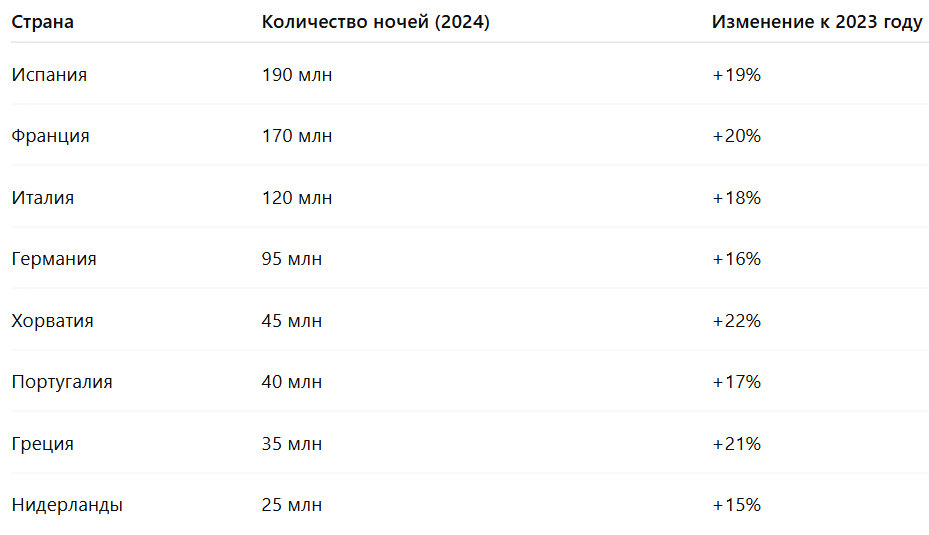Вusiness / Real Estate / Investments / Tourism & hospitality / Analytics / Research / Reviews 29.04.2025
The Short-Term Rental Market in Europe 2024–2025 and Its Outlook: A Study by International Private Investment

Key Data
۰ 854 million short-term rental nights in the EU in 2024
۰ 18.8% growth compared to 2023
Top Regions
۰ Adriatic Coast (Croatia)
۰ Andalusia (Spain)
۰ Provence (France)
Situation in Individual Countries
۰ Spain, France, Italy – leaders by volume
۰ Barcelona plans a complete ban on short-term rentals
۰ Portugal restricted issuance of new licenses in Lisbon
۰ United Kingdom, Norway, Switzerland – 90-day annual limit
۰ Turkey tightened licensing rules
۰ Dubai requires mandatory property registration
Georgia – Star of the Region
۰ 35% growth in the number of nights
۰ No strict regulations
۰ Promising market in Tbilisi and Batumi
Solution for Investors – Apart-hotels:
۰ Not subject to apartment rental restrictions
۰ Legal short-term rental
۰ Stable income without legal risks
Full Research
According to Eurostat, 854.1 million nights were booked via short-term rental platforms (Airbnb, Booking, Expedia, and TripAdvisor) in the European Union in 2024. This is an 18.8% increase compared to 2023. Out of this volume, around 54 million nights were in private short-term accommodations not connected to the hotel business.
Significant growth was observed in Southern Europe, where the warm climate and rich cultural heritage attracted millions of tourists. Three regions emerged as absolute leaders:
- Adriatic Coast of Croatia – 25.2 million nights,
- Andalusia (Spain) – 17.2 million nights,
- Provence-Alpes-Côte d'Azur (France) – 15.6 million nights (source).
Thus, in 2024, the short-term rental market in the EU not only recovered after the pandemic but also surpassed 2019 levels.
Top-10 Countries

190 million rental nights in Spain are explained not only by the popularity of coastal regions but also by strong domestic tourism.
France, ranking second, strengthened its position thanks to the popularity of Provence and Paris.
Italy showed solid growth by expanding tourist flows to its southern regions.
Germany mainly focuses on the domestic rental market.
Croatia surprised with a 22% increase due to active promotion of the Adriatic Coast.
Portugal and Greece maintain stable growth, supported by "Golden Visa" programs and tourism campaigns.
The Netherlands posted moderate growth, mainly due to Amsterdam, despite existing rental restrictions.
European Countries Outside the EU
According to Airbnb, short-term rentals in Switzerland grew by 12%, though strict restrictions apply: renting without a license is limited to 90 days per year.
Norway showed market resilience, especially in Oslo and Bergen. However, a 90-day limit without a license is in place.
In the United Kingdom, London, Edinburgh, and Manchester maintain high occupancy levels. A 90-day limit applies without the need for licensing.
See also: Paris Reduces Short-term Rental Periods
Neighboring Regions
Compared to Europe, neighboring regional markets show varying maturity levels:
According to Egypt's Ministry of Tourism, around 18 million short-term rental nights were recorded in 2024. There are no rental restrictions, but the sector remains underregulated and risky for investors.
In 2024, Turkey's short-term rental market reached 50 million nights, reports Daily Sabah. However, from October 2024, new regulations require properties to have a license, issued under stricter conditions.
In Dubai, the number of rental nights exceeded 30 million in 2024, according to Visit Dubai. However, a high level of regulation is in place, and all properties must be registered for short-term rental with DTCM (Department of Tourism and Commerce Marketing).
Georgia: In 2024, about 12 million nights were recorded. Growth exceeded 35% compared to 2023, writes Agenda.ge. The Georgian market is characterized by easy property registration, low taxes, and an absence of strict short-term rental regulations.
Legislative Restrictions on Short-term Rentals in Europe
Spain: Barcelona plans to ban short-term apartment rentals by 2028, reports El País. Strict restrictions are already in place in Madrid, Valencia, and the Balearic Islands.
France: In Paris, private housing can be rented out for a maximum of 120 days per year, reminds Paris.fr. To increase this limit, registration and compliance with specific requirements are necessary.
Germany: In Berlin, renting out apartments requires permission from the Department of Urban Development and Housing.
Portugal: Since 2024, the issuance of new AL (Alojamento Local) licenses for short-term rentals has been restricted in Lisbon and Porto, writes Idealista.
Thus, the trend in the EU is clear: demand for short-term rentals is rising, but regulatory pressure is increasing.
How to Bypass Restrictions: Investing in Apart-hotels
One solution for investors is purchasing units in apart-hotels, which:
- have hotel operation licenses,
- are originally designed for short-term stays,
- are not subject to restrictions applying to residential properties (Colliers International).
This approach ensures stable income, legal operation on the rental market, and avoidance of risks associated with regulatory changes.
Georgia – Promising Leader
Today, Georgia is recognized as one of the fastest-growing short-term rental markets in the region. In 2024:
- over 12 million rental nights were registered;
- the number of short-term rental properties grew by 35%;
- the legislation remains liberal, with no separate licensing required for short-term property rentals.
Tbilisi and Batumi are becoming centers of investment attractiveness, supported by tourism infrastructure development programs.
Analysts at Colliers Georgia forecast continued market growth of 10-15% annually until 2027, making Georgia the most promising destination for short-term rental investments in the region.











